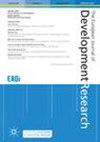Criminal for Prostitution Based on Regional Regulation of Surabaya City Viewed From the Perspective of the KUHP
IF 2.6
3区 社会学
Q2 DEVELOPMENT STUDIES
引用次数: 0
Abstract
Crime cannot be separated between space and time, it can be committed by anyone and the victim can be anyone. Crime not only violates legal norms, but also violates social norms that apply in society and religious norms. Currently, if interpreted in reverse (a contrario) if there is an act (prostitution) which is of course an act that is condemned by society, but on the one hand it is not listed as an act or a criminal offense according to the Criminal Code (KUHP). how is the classification of this action and how is the law enforcement effort carried out. Being a commercial sex worker (PSK) and someone who uses the services of a commercial sex worker (PSK) are considered to have committed a crime and can be subject to criminal sanctions according to Surabaya City Regional Regulation Number 2 of 2020 concerning Amendments to Surabaya City Regional Regulation Number 2 of 2014 concerning the Implementation of Public Order and Public Peace, on the one hand the Criminal Code does not qualify these actions as criminal acts. The clash of norms occurred in the arrangement of the criminal law for prostitution in the city of Surabaya.基于KUHP视角的泗水地区规制中的卖淫犯罪
犯罪不分时间和空间,任何人都可以犯罪,任何人都可以成为受害者。犯罪不仅违反法律规范,而且违反适用于社会的社会规范和宗教规范。目前,如果存在一种行为(卖淫),这种行为当然是受到社会谴责的行为,但根据《刑法》,它一方面不被列为行为或刑事犯罪,则反过来解释(contrario)。这一行动的分类是怎样的?执法工作是怎样进行的?作为一名商业性工作者(PSK)和使用商业性工作者(PSK)服务的人被认为是犯罪,根据泗水市2020年第2号地区条例关于2014年泗水市第2号地区条例关于实施公共秩序和公共和平的修正案,可以受到刑事制裁,一方面,《刑法》没有将这些行为定性为犯罪行为。规范的冲突发生在泗水市卖淫刑法的安排上。
本文章由计算机程序翻译,如有差异,请以英文原文为准。
求助全文
约1分钟内获得全文
求助全文
来源期刊

European Journal of Development Research
DEVELOPMENT STUDIES-
CiteScore
5.70
自引率
4.00%
发文量
77
期刊介绍:
The European Journal of Development Research (EJDR) redefines and modernises what international development is, recognising the many schools of thought on what human development constitutes. It encourages debate between competing approaches to understanding global development and international social development. The journal is multidisciplinary and welcomes papers that are rooted in any mixture of fields including (but not limited to): development studies, international studies, social policy, sociology, politics, economics, anthropology, education, sustainability, business and management. EJDR explicitly links with development studies, being hosted by European Association of Development Institutes (EADI) and its various initiatives.
As a double-blind peer-reviewed academic journal, we particularly welcome submissions that improve our conceptual understanding of international development processes, or submissions that propose policy and developmental tools by analysing empirical evidence, whether qualitative, quantitative, mixed methods or anecdotal (data use in the journal ranges broadly from narratives and transcripts, through ethnographic and mixed data, to quantitative and survey data). The research methods used in the journal''s articles make explicit the importance of empirical data and the critical interpretation of findings. Authors can use a mixture of theory and data analysis to expand the possibilities for global development.
Submissions must be well-grounded in theory and must also indicate how their findings are relevant to development practitioners in the field and/or policy makers. The journal encourages papers which embody the highest quality standards, and which use an innovative approach. We urge authors who contemplate submitting their work to the EJDR to respond to research already published in this journal, as well as complementary journals and books. We take special efforts to include global voices, and notably voices from the global South. Queries about potential submissions to EJDR can be directed to the Editors.
EJDR understands development to be an ongoing process that affects all communities, societies, states and regions: We therefore do not have a geographical bias, but wherever possible prospective authors should seek to highlight how their study has relevance to researchers and practitioners studying development in different environments. Although many of the papers we publish examine the challenges for developing countries, we recognize that there are important lessons to be derived from the experiences of regions in the developed world.
The EJDR is print-published 6 times a year, in a mix of regular and special theme issues; accepted papers are published on an ongoing basis online. We accept submissions in English and French.
 求助内容:
求助内容: 应助结果提醒方式:
应助结果提醒方式:


